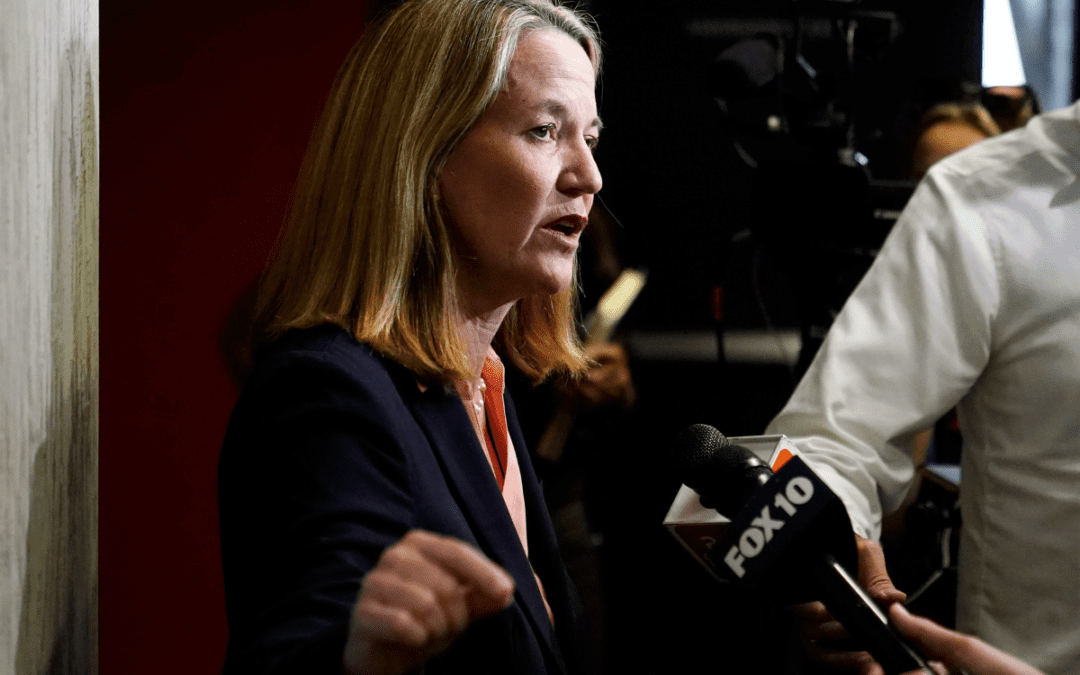
The newly proposed rule would gut protections for those escaping gender-based and gang violence.
The Trump administration has unveiled its furthest-reaching plan yet to change asylum law in the U.S., redefining the meaning of “persecution” and raising the bar for refugees seeking protection under the Convention Against Torture, among other changes.
The 161-page proposal, officially posted Monday in the Federal Register, would also streamline the asylum-approval process, letting immigration judges rather than immigration courts make rulings in asylum cases and redefining the definition of a frivolous application.
RELATED: Arizona Senate Passes Pro-Refugee Resolution
The proposal follows similar actions by the departments of Homeland Security and Justice, but legal experts say this time it will be harder to challenge in court than those previous rules.
“Essentially this rule tries, in a way that hasn’t been done before, to define what can be grounds for asylum,” said Jessica Bolter, an associate policy analyst at the Migration Policy Institute.
Preparing for refugees
If approved, the change could further reduce the number of refugees moving to Arizona. Refugee resettlement was temporarily halted in March due to the coronavirus pandemic, leaving refugees waiting for nearly three months. But before then, a little over 7,000 refugees had been allowed into the U.S. so far this year, including 440 to Arizona, the bulk of them in Phoenix and surrounding communities.
To prepare for an anticipated influx of refugees, the Phoenix City Council has approved $3 million in federal relief funds for area refugees. The funds would help those who were caught up in the financial fallout from the coronavirus pandemic after being settled here with U.S. government approval.
The proposal, put forward by Mayor Kate Gallego, provides resources to help people who came to the U.S. fleeing violence or persecution in their countries of birth only to lose their new jobs in food service, hospitality and other industries disproportionately affected by the virus outbreak.
An assault on asylum
While Phoenix’s proposal aims to help refugees who have already settled in the state, Trump’s proposal seeks to reduce the number who have not yet been approved to settle in the U.S. The federal proposal, first unveiled Wednesday, was swiftly condemned by advocates like the Tahirih Justice Center, which called the proposed regulations “an assault on the fundamental right to seek asylum.”
“If fully implemented, they will gut years of progress in the U.S. to create bridges to safety for so many whose governments could not and would not protect them from severe harm and even death,” said a statement from the nonprofit, which advocates for immigrants escaping gender-based violence.
RELATED: Trump Uses Coronavirus to Shut Down Asylum System
But conservatives like Rep. Andy Biggs, R-Gilbert, welcomed the changes that he said would cut back on the number of “baseless asylum claims.”
“Eligible individuals in need of relief from persecution in their home countries should have an avenue to seek that relief,” Biggs said in a statement Monday. “But our system has become a tool that aliens unfairly use to gain illegal access to our nation and to slow down their deportation process.”
Weakened protections
Bolter said the proposed rule “further raises the standard of proof that migrants have to reach during that initial fear screening interview,” the first step toward determining whether a refugee is in danger if returned to his or her home country.
“So in order to even get to the point where they’re making a claim for protection under the Convention Against Torture, they have to meet an even higher standard of proof in their initial screening that they have right after being apprehended at the border,” she said.
Among the most-severe elements, Bolter said, the new rule would gut protections for those escaping gender-based and gang violence in their countries. It also narrows the categories of people who face persecution on account of their race, nationality, religion, political opinions or “social group.”
The Justice Department said in a statement last week that the rule “would more effectively separate baseless claims from meritorious ones.” But Bolter worries that will give the government too much leeway in determining what is frivolous and what is meritorious before the cases are fully heard.
Awaiting public comment
The proposal is subject to public comment through July 15, at which point the government has to review and respond before it can put any changes into effect. After the 30-day public comment period, the only other way for critics to challenge the ruling is in court, but experts said that will be difficult.
Lynn Marcus, a University of Arizona law professor, said that because of how “multifaceted” the proposal is, finding one plaintiff who could challenge all aspects of the regulation would be challenging. It would be more effective if organizations, instead of individuals, were plaintiffs in any legal challenge, she said.
“There might be a way to do it with organizational plaintiffs where you have organizations that help asylum seekers who say that the regulations are illegal, and we’re not able to help anyone apply for asylum because all the people that we would help with would be illegally barred,” Marcus said.
People could also challenge the rule on constitutional grounds, said Arash Tavanaei, an attorney at CIMA Law Group in Phoenix, although that would be difficult, too.
“It’s going to be very challenging, and I think that administration knows that,” he said.
Ultimately, advocates said, opponents may have to make their dissatisfaction known at the ballot box.
“It’s been ban upon ban upon ban. And this is the last nail in the coffin for asylum if it takes effect,” Marcus said of the administration.
READ ON: Immigration Judges Say Their Courts Are a Health Hazard

BREAKING: AG Kris Mayes sues rental corporations for conspiratorial price-fixing
It looks like, legally speaking, rent really may be “too damn high.” Arizona Attorney General Kris Mayes announced Wednesday a lawsuit against nine...

Op-ed: Trump’s journey from hosting The Apprentice to being the biggest loser
Leading up to the 2016 election, Donald Trump crafted an image of himself as a successful businessman and a winner. But in reality, Trump has a long...

Kari Lake’s plan for the US Senate: ‘The end of democracy’
The world’s most far-right political leaders flocked to National Harbor, Maryland, last week for a conservative conference where attendants idolized...

Flight attendants picket at more than 30 airports in ‘unprecedented’ show of solidarity
Hundreds of flight attendants picketed at Phoenix Sky Harbor Airport last week, calling attention to stagnant wages with low purchasing power, poor...




